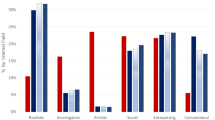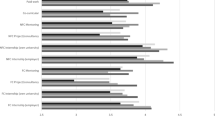Abstract
The relationships between higher education and the world of work are viewed, principally, as similar in economically advanced societies. The comparative study `Higher Education and Graduate Employment in Europe', however, indicates substantial differences between European countries as regards transition to employment, as well as the employment and work situation, according to objective and subjective measures. The analysis is based on a survey of more than 30,000 graduates from 10 European countries about 3–4 years after graduation. The findings suggest that only a minority of 10–20% of graduates face substantial problems on the labour market or end up in positions not commensurate with their level of education. There is a clear North-South differential in Europe with respect to transition and objective employment measures, while the pattern is moredifferentiated with respect to the perceivedutilisation of knowledge, the self-ratedadequacy of position and the job satisfaction.
Similar content being viewed by others

REFERENCES
Bowers, N. Sonnet, A. & Bardone, L. (1999). Giving Young People a Good Start: The Experience of OECD Countries. In OECD (ed.), Preparing Youth for the 21st Century. Paris: OECD, 7–87.
Brennan, J., Johnston, B., Little, B. Shah, T. & Woodley, A. (2001). The Employment of UK Graduates: Comparisons with Europe and Japan. London: Higher Education Funding Council for England and Open University, CHERI.
Eurydice (1997). Key Data on Education in the European Union 97. Luxemburg: Office for Official Publications of the European Communities.
Nihon Rôdô Kenkyû Kikô (2001). Nichio no daigaku to shokugyô: Kôtôkyôiku to shkugyô ni kansuru 12kakoku hikaku chôsa kekka. Tokyo: Nihon Rôdô Kenkyu Kikô.
OECD (1997a). Education at a Glance: OECD Indicators 1997. Paris.
OECD (1997b). Education Policy Analysis 1997. Paris.
Paul, J.-J., Teichler, U. & van der Velden, R. (eds) (2000). Higher Education and Graduate Employment (special issue), European Journal of Education 35(2).
Perkin, J. (1996). The Third Revolution: Professional Elites in the Modern World. London: Routledge.
Schomburg, H., Teichler, U., Doerry, M. & Mohr, J. (eds) (2001). Erfolgreich von der Uni in den Job. Regensburg: Fit for Business.
Teichler, U., Hartung, D. & Nuthmann, R. (1980). Higher Education and the Needs of Society. Windsor: NFER Publishing Company.
Teichler, U. (1988). Higher Education and Work in Europe. In J.C. Smart (ed.), Higher Education: Handbook of Theory and Research, Vol. 4. New York: Agathon Press, 109–182.
Teichler, U. (1999). Research on the Relationships between Higher Education and the World of Work: Past Achievements, Problems and New Challenges, Higher Education 38(2), 169–190.
Teichler, U. (2000). Employment and Work in Selected European Countries, European Journal of Education 35(2), 141–156.
Author information
Authors and Affiliations
Rights and permissions
About this article
Cite this article
Teichler, U. Graduate Employment and Work in europe: Diverse Situations and Common Perceptions. Tertiary Education and Management 8, 199–216 (2002). https://doi.org/10.1023/A:1016357826723
Issue Date:
DOI: https://doi.org/10.1023/A:1016357826723



